Florida National University: Presentation on Nurse Practice Act
VerifiedAdded on 2023/03/23
|14
|1357
|77
Presentation
AI Summary
This presentation provides an overview of the Nurse Practice Act (NPA), emphasizing its importance in guiding and governing nursing actions to ensure patient safety and quality healthcare. It covers the history of the NPA, its evolution from community-based care to state-regulated standards, and the role of the Board of Nursing (BON) in enforcing compliance. The presentation outlines the need for a nurse's guide to action due to expanding roles and responsibilities, the authority of the BON, criteria for disciplinary action, and the scope of nursing practice. It also addresses patient information accessibility and criticisms of the NPA, concluding that the NPA is essential for maintaining professional nursing practice and ensuring safe patient care. References to various articles and journals are included to support the information presented.
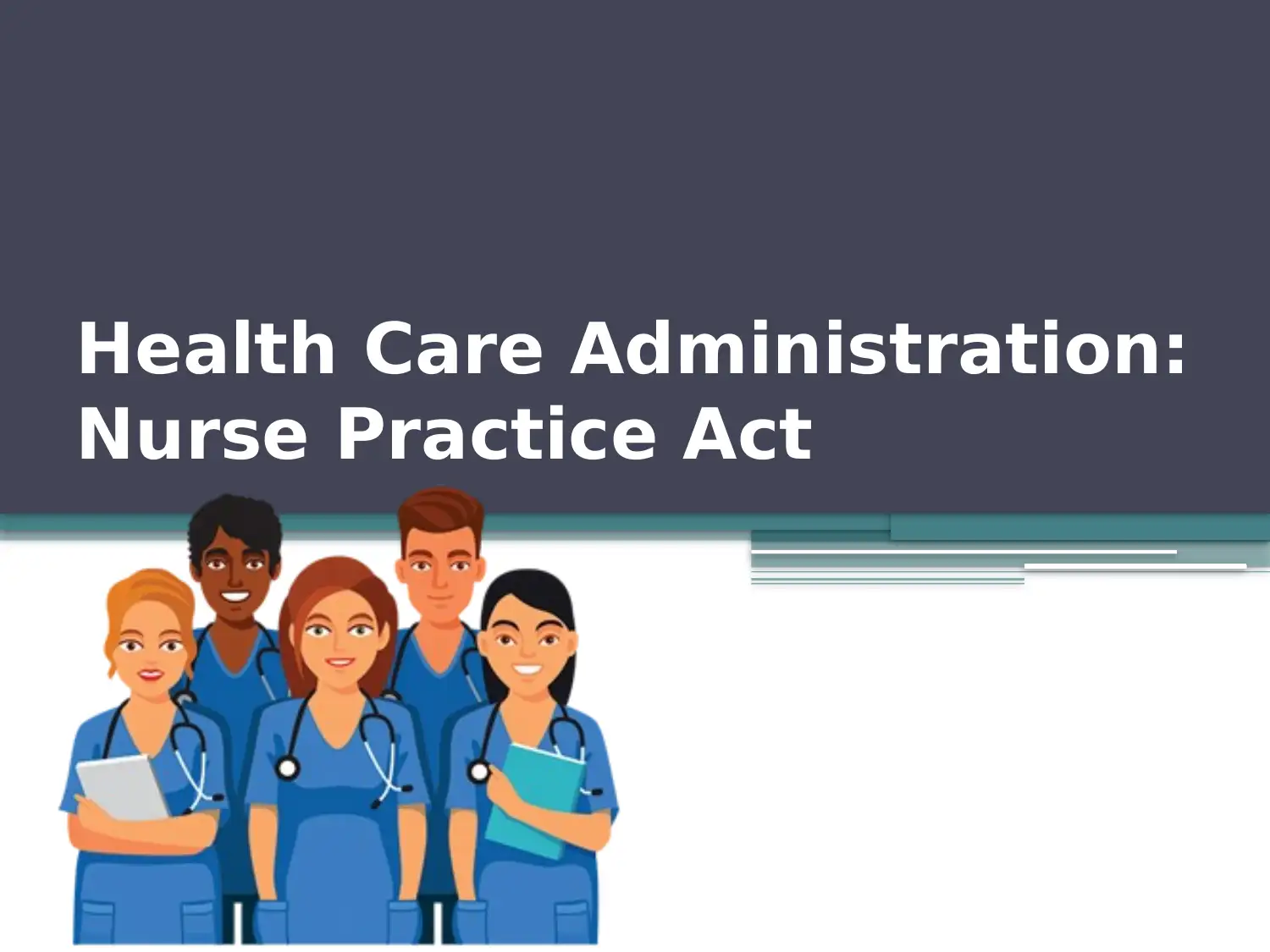
Health Care Administration:
Nurse Practice Act
Nurse Practice Act
Paraphrase This Document
Need a fresh take? Get an instant paraphrase of this document with our AI Paraphraser
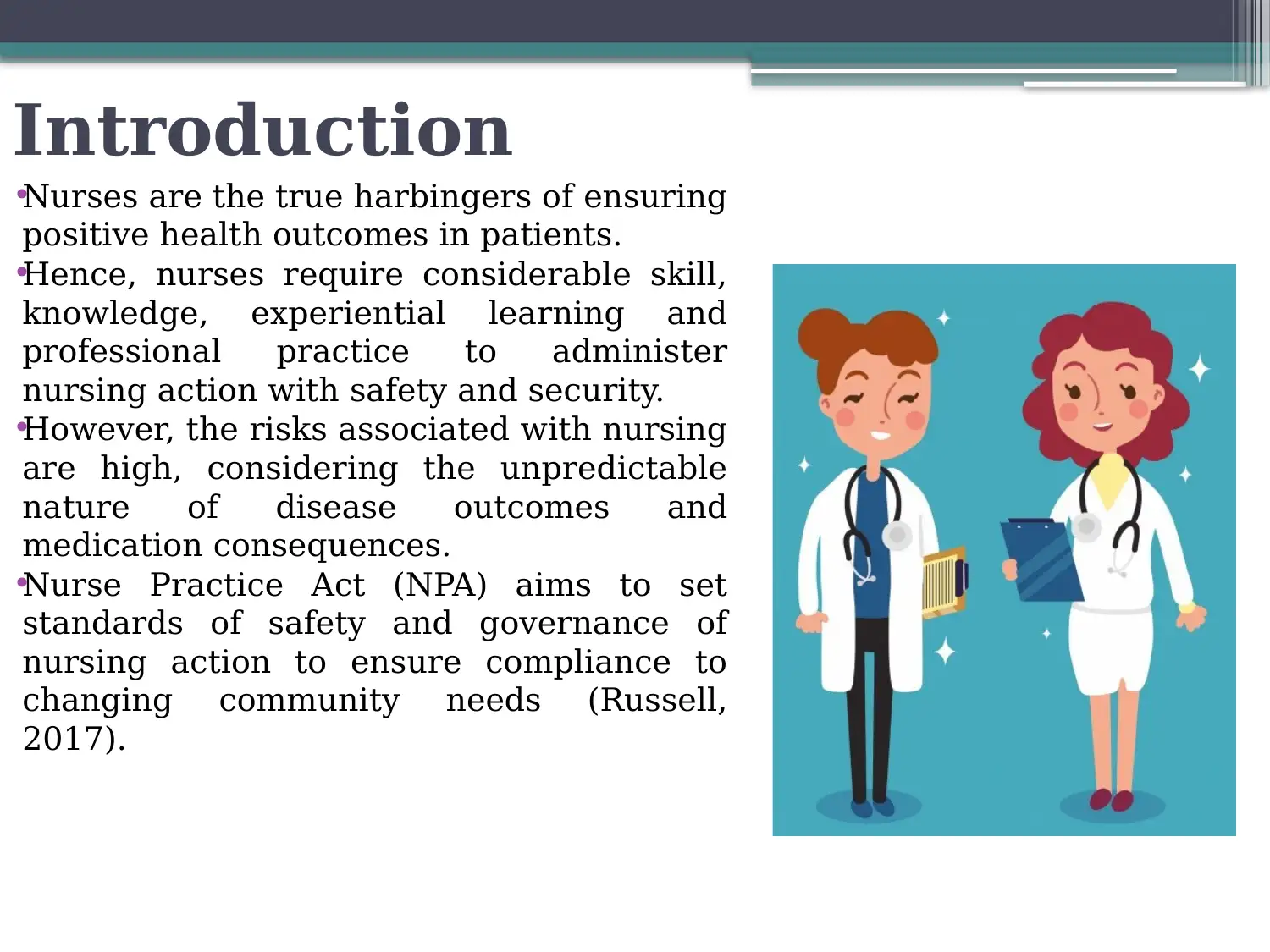
Introduction
•Nurses are the true harbingers of ensuring
positive health outcomes in patients.
•Hence, nurses require considerable skill,
knowledge, experiential learning and
professional practice to administer
nursing action with safety and security.
•However, the risks associated with nursing
are high, considering the unpredictable
nature of disease outcomes and
medication consequences.
•Nurse Practice Act (NPA) aims to set
standards of safety and governance of
nursing action to ensure compliance to
changing community needs (Russell,
2017).
•Nurses are the true harbingers of ensuring
positive health outcomes in patients.
•Hence, nurses require considerable skill,
knowledge, experiential learning and
professional practice to administer
nursing action with safety and security.
•However, the risks associated with nursing
are high, considering the unpredictable
nature of disease outcomes and
medication consequences.
•Nurse Practice Act (NPA) aims to set
standards of safety and governance of
nursing action to ensure compliance to
changing community needs (Russell,
2017).
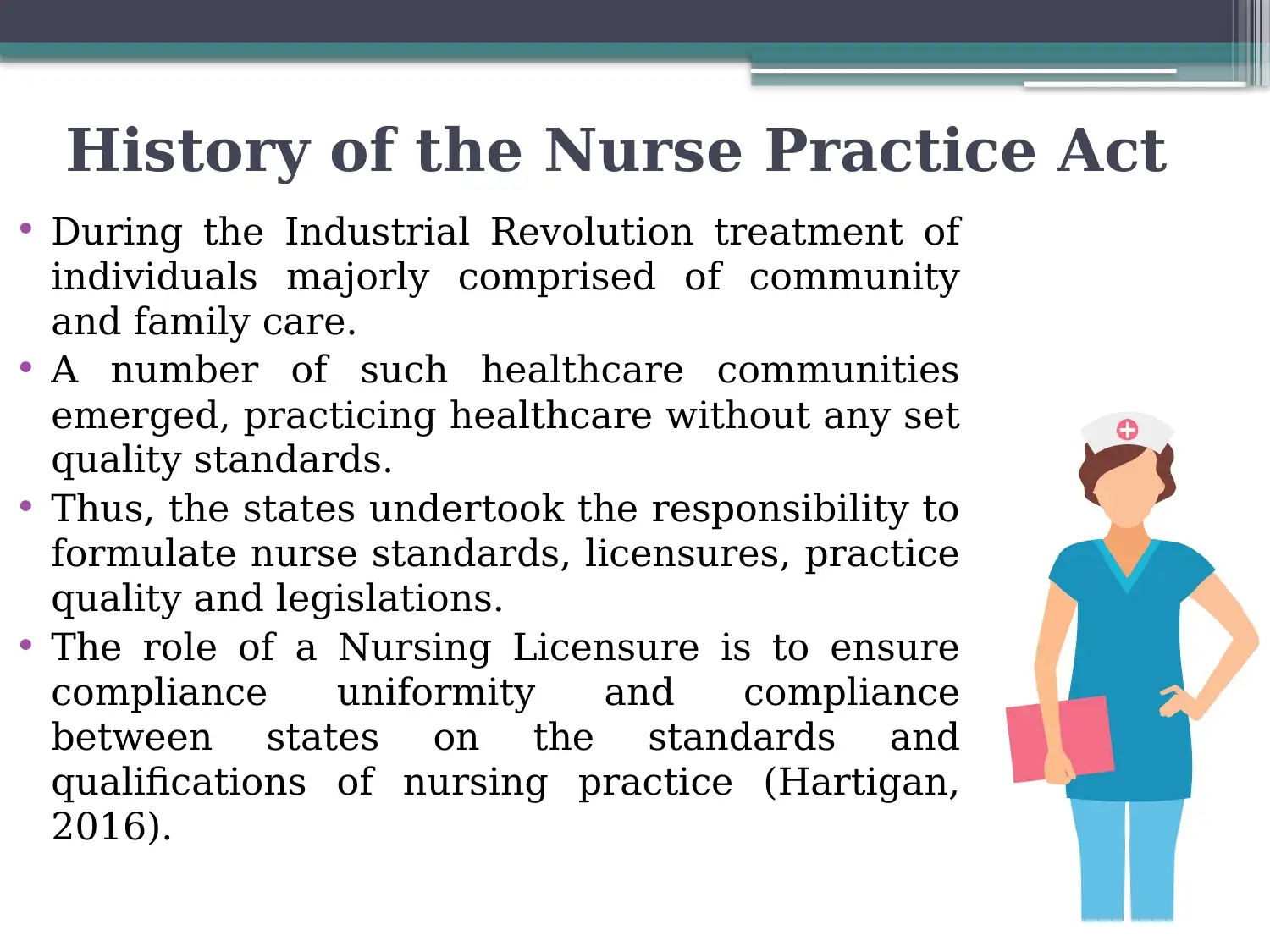
History of the Nurse Practice Act
• During the Industrial Revolution treatment of
individuals majorly comprised of community
and family care.
• A number of such healthcare communities
emerged, practicing healthcare without any set
quality standards.
• Thus, the states undertook the responsibility to
formulate nurse standards, licensures, practice
quality and legislations.
• The role of a Nursing Licensure is to ensure
compliance uniformity and compliance
between states on the standards and
qualifications of nursing practice (Hartigan,
2016).
• During the Industrial Revolution treatment of
individuals majorly comprised of community
and family care.
• A number of such healthcare communities
emerged, practicing healthcare without any set
quality standards.
• Thus, the states undertook the responsibility to
formulate nurse standards, licensures, practice
quality and legislations.
• The role of a Nursing Licensure is to ensure
compliance uniformity and compliance
between states on the standards and
qualifications of nursing practice (Hartigan,
2016).
⊘ This is a preview!⊘
Do you want full access?
Subscribe today to unlock all pages.

Trusted by 1+ million students worldwide
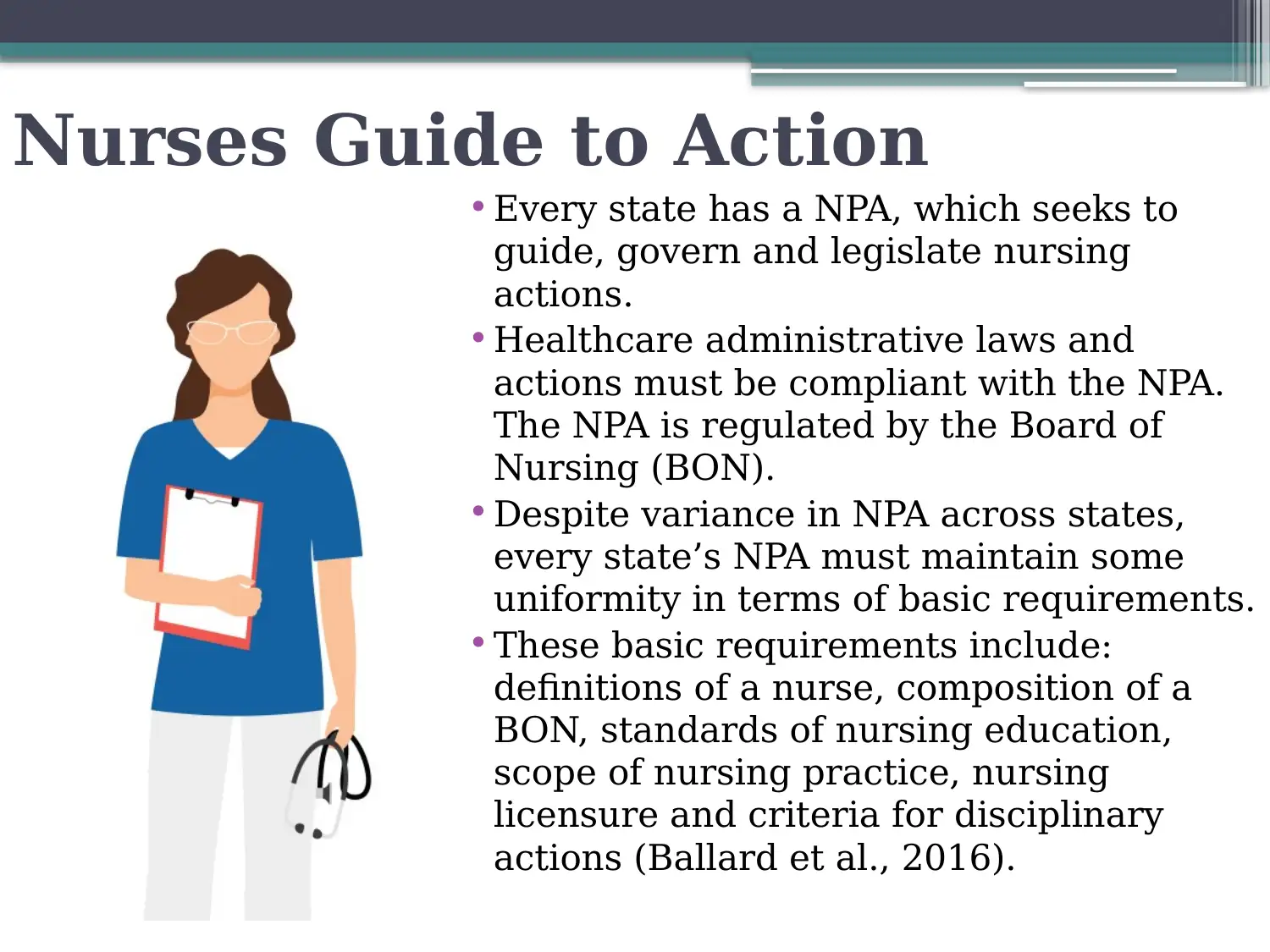
Nurses Guide to Action
• Every state has a NPA, which seeks to
guide, govern and legislate nursing
actions.
• Healthcare administrative laws and
actions must be compliant with the NPA.
The NPA is regulated by the Board of
Nursing (BON).
• Despite variance in NPA across states,
every state’s NPA must maintain some
uniformity in terms of basic requirements.
• These basic requirements include:
definitions of a nurse, composition of a
BON, standards of nursing education,
scope of nursing practice, nursing
licensure and criteria for disciplinary
actions (Ballard et al., 2016).
• Every state has a NPA, which seeks to
guide, govern and legislate nursing
actions.
• Healthcare administrative laws and
actions must be compliant with the NPA.
The NPA is regulated by the Board of
Nursing (BON).
• Despite variance in NPA across states,
every state’s NPA must maintain some
uniformity in terms of basic requirements.
• These basic requirements include:
definitions of a nurse, composition of a
BON, standards of nursing education,
scope of nursing practice, nursing
licensure and criteria for disciplinary
actions (Ballard et al., 2016).
Paraphrase This Document
Need a fresh take? Get an instant paraphrase of this document with our AI Paraphraser
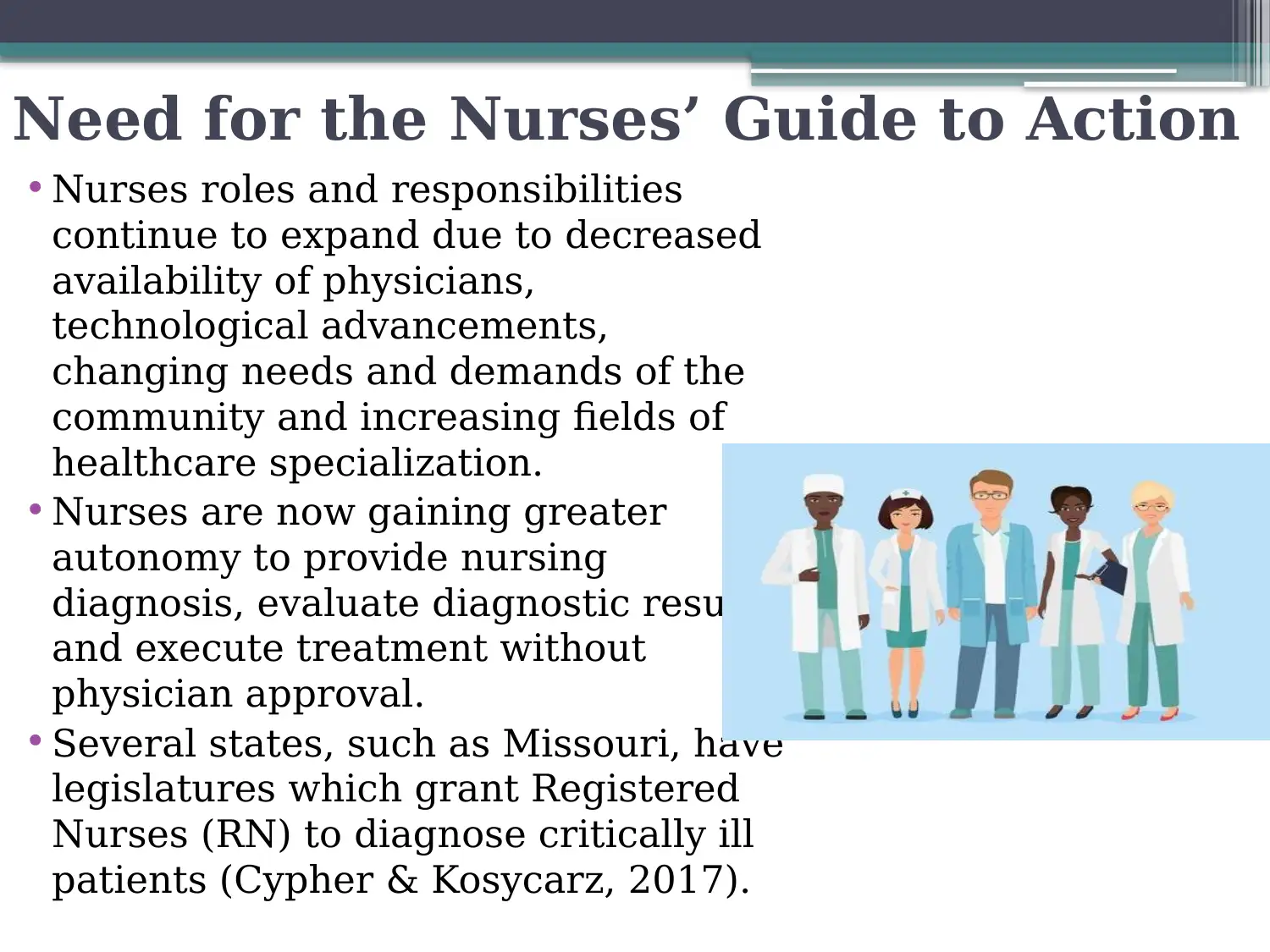
Need for the Nurses’ Guide to Action
• Nurses roles and responsibilities
continue to expand due to decreased
availability of physicians,
technological advancements,
changing needs and demands of the
community and increasing fields of
healthcare specialization.
• Nurses are now gaining greater
autonomy to provide nursing
diagnosis, evaluate diagnostic results
and execute treatment without
physician approval.
• Several states, such as Missouri, have
legislatures which grant Registered
Nurses (RN) to diagnose critically ill
patients (Cypher & Kosycarz, 2017).
• Nurses roles and responsibilities
continue to expand due to decreased
availability of physicians,
technological advancements,
changing needs and demands of the
community and increasing fields of
healthcare specialization.
• Nurses are now gaining greater
autonomy to provide nursing
diagnosis, evaluate diagnostic results
and execute treatment without
physician approval.
• Several states, such as Missouri, have
legislatures which grant Registered
Nurses (RN) to diagnose critically ill
patients (Cypher & Kosycarz, 2017).
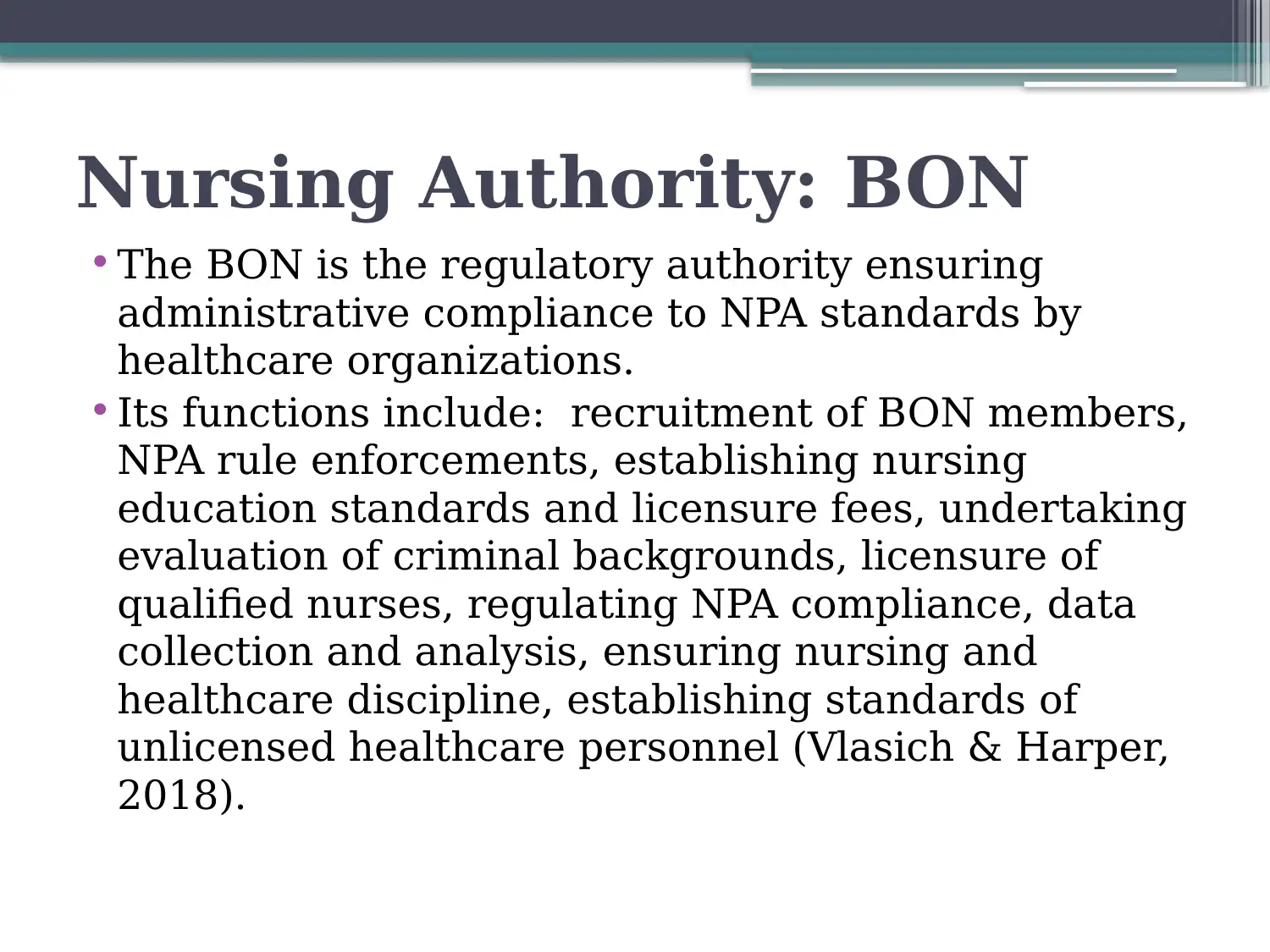
Nursing Authority: BON
• The BON is the regulatory authority ensuring
administrative compliance to NPA standards by
healthcare organizations.
• Its functions include: recruitment of BON members,
NPA rule enforcements, establishing nursing
education standards and licensure fees, undertaking
evaluation of criminal backgrounds, licensure of
qualified nurses, regulating NPA compliance, data
collection and analysis, ensuring nursing and
healthcare discipline, establishing standards of
unlicensed healthcare personnel (Vlasich & Harper,
2018).
• The BON is the regulatory authority ensuring
administrative compliance to NPA standards by
healthcare organizations.
• Its functions include: recruitment of BON members,
NPA rule enforcements, establishing nursing
education standards and licensure fees, undertaking
evaluation of criminal backgrounds, licensure of
qualified nurses, regulating NPA compliance, data
collection and analysis, ensuring nursing and
healthcare discipline, establishing standards of
unlicensed healthcare personnel (Vlasich & Harper,
2018).
⊘ This is a preview!⊘
Do you want full access?
Subscribe today to unlock all pages.

Trusted by 1+ million students worldwide
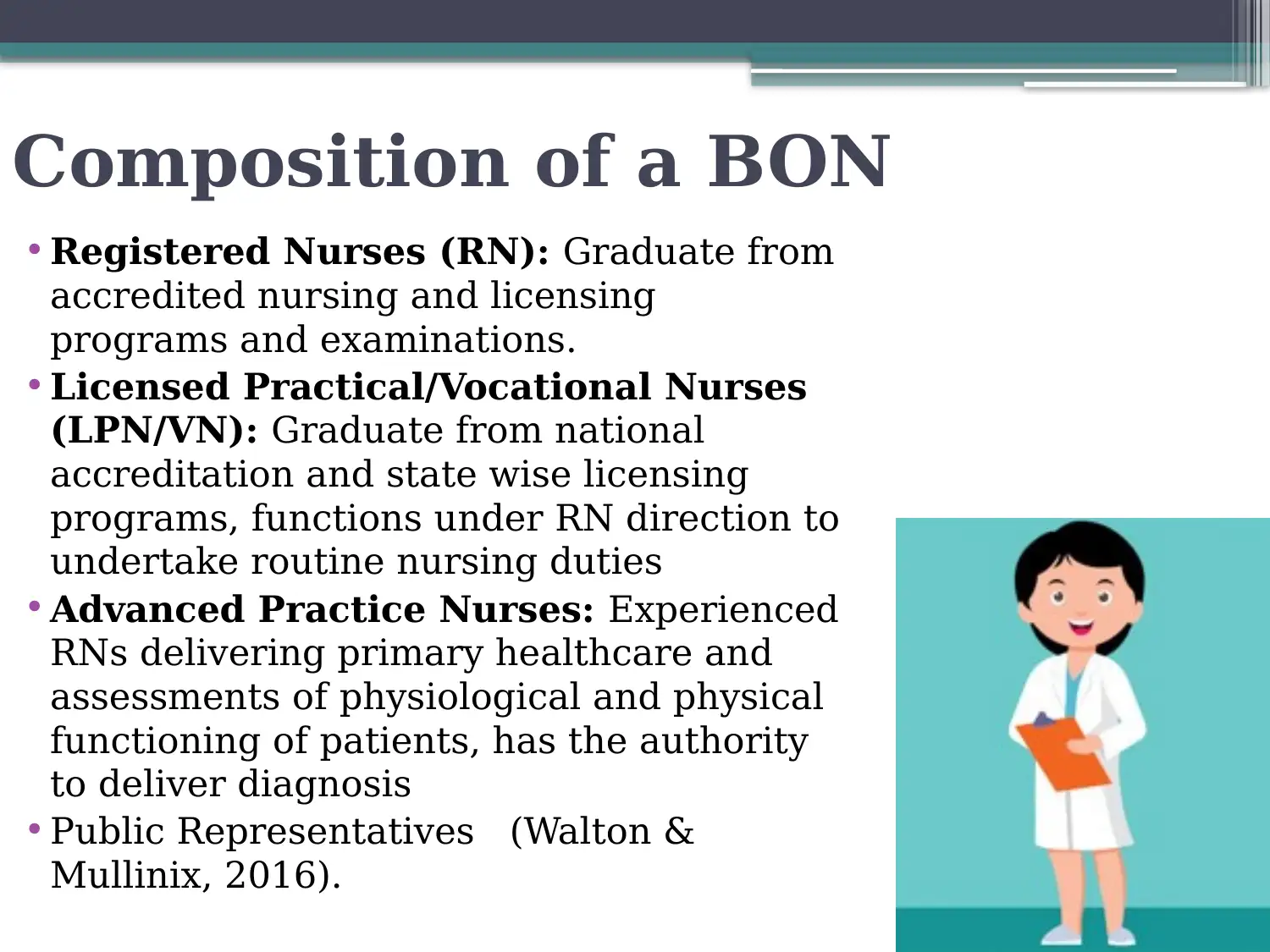
Composition of a BON
• Registered Nurses (RN): Graduate from
accredited nursing and licensing
programs and examinations.
• Licensed Practical/Vocational Nurses
(LPN/VN): Graduate from national
accreditation and state wise licensing
programs, functions under RN direction to
undertake routine nursing duties
• Advanced Practice Nurses: Experienced
RNs delivering primary healthcare and
assessments of physiological and physical
functioning of patients, has the authority
to deliver diagnosis
• Public Representatives (Walton &
Mullinix, 2016).
• Registered Nurses (RN): Graduate from
accredited nursing and licensing
programs and examinations.
• Licensed Practical/Vocational Nurses
(LPN/VN): Graduate from national
accreditation and state wise licensing
programs, functions under RN direction to
undertake routine nursing duties
• Advanced Practice Nurses: Experienced
RNs delivering primary healthcare and
assessments of physiological and physical
functioning of patients, has the authority
to deliver diagnosis
• Public Representatives (Walton &
Mullinix, 2016).
Paraphrase This Document
Need a fresh take? Get an instant paraphrase of this document with our AI Paraphraser
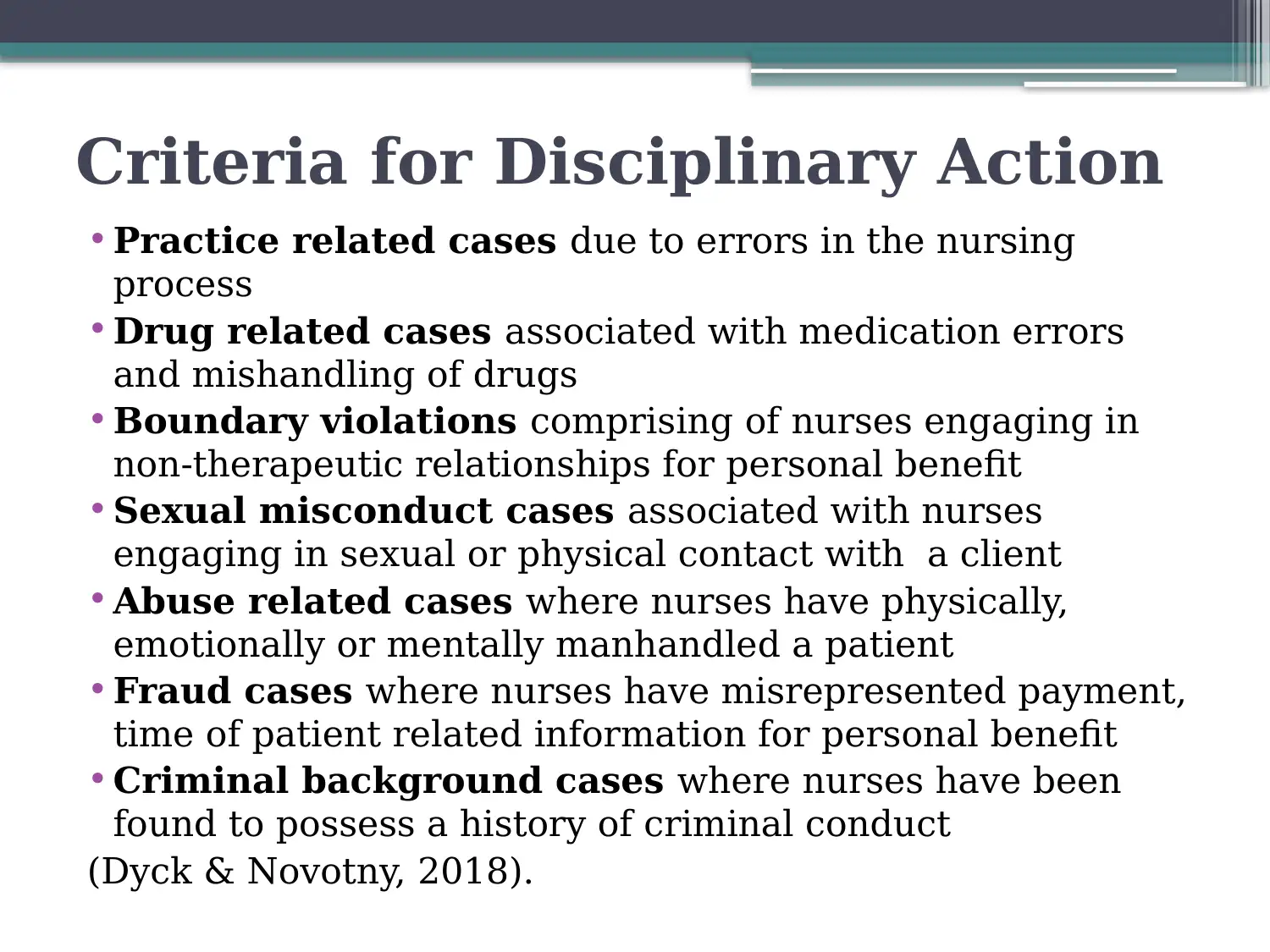
Criteria for Disciplinary Action
• Practice related cases due to errors in the nursing
process
• Drug related cases associated with medication errors
and mishandling of drugs
• Boundary violations comprising of nurses engaging in
non-therapeutic relationships for personal benefit
• Sexual misconduct cases associated with nurses
engaging in sexual or physical contact with a client
• Abuse related cases where nurses have physically,
emotionally or mentally manhandled a patient
• Fraud cases where nurses have misrepresented payment,
time of patient related information for personal benefit
• Criminal background cases where nurses have been
found to possess a history of criminal conduct
(Dyck & Novotny, 2018).
• Practice related cases due to errors in the nursing
process
• Drug related cases associated with medication errors
and mishandling of drugs
• Boundary violations comprising of nurses engaging in
non-therapeutic relationships for personal benefit
• Sexual misconduct cases associated with nurses
engaging in sexual or physical contact with a client
• Abuse related cases where nurses have physically,
emotionally or mentally manhandled a patient
• Fraud cases where nurses have misrepresented payment,
time of patient related information for personal benefit
• Criminal background cases where nurses have been
found to possess a history of criminal conduct
(Dyck & Novotny, 2018).
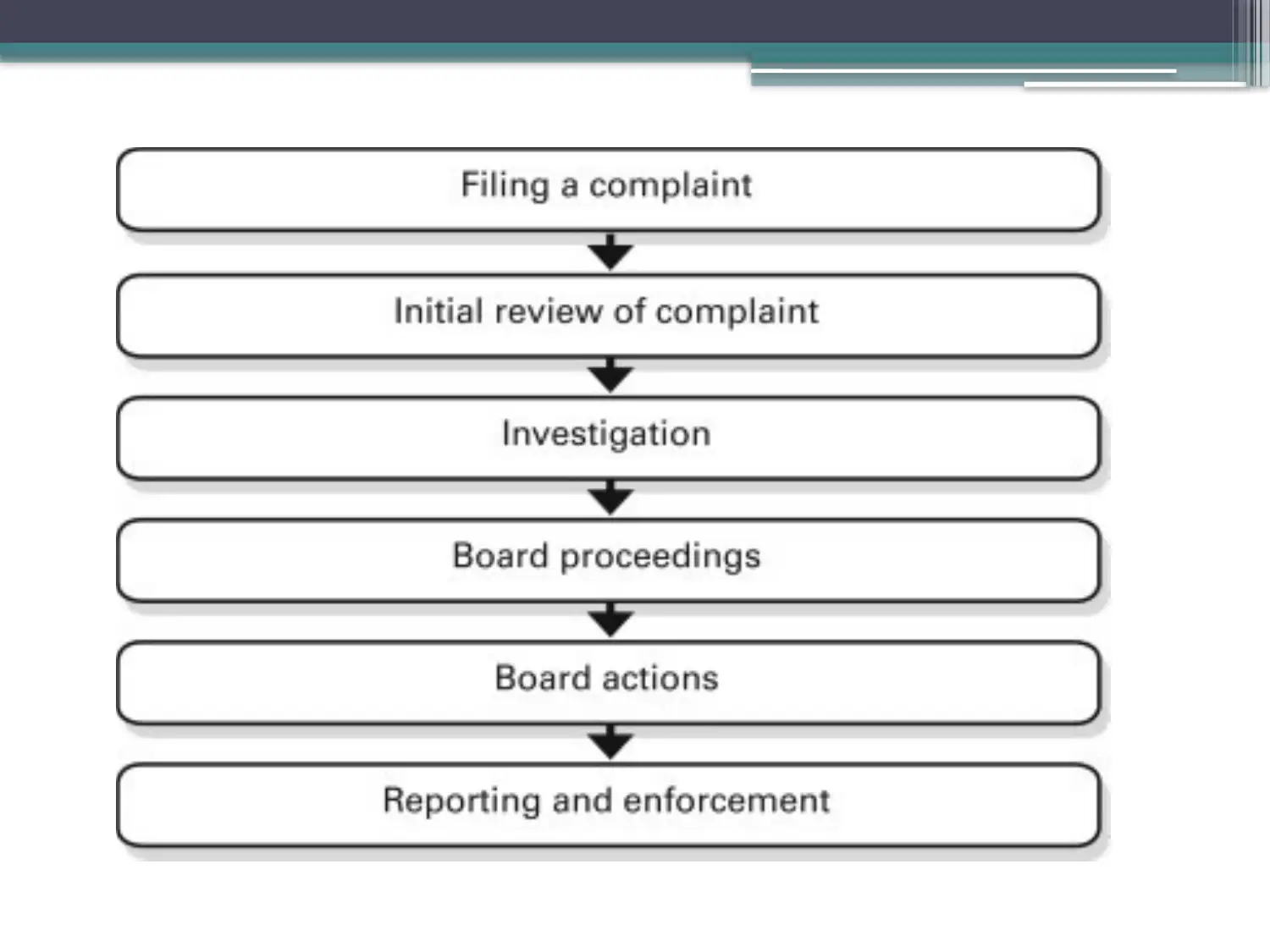
⊘ This is a preview!⊘
Do you want full access?
Subscribe today to unlock all pages.

Trusted by 1+ million students worldwide
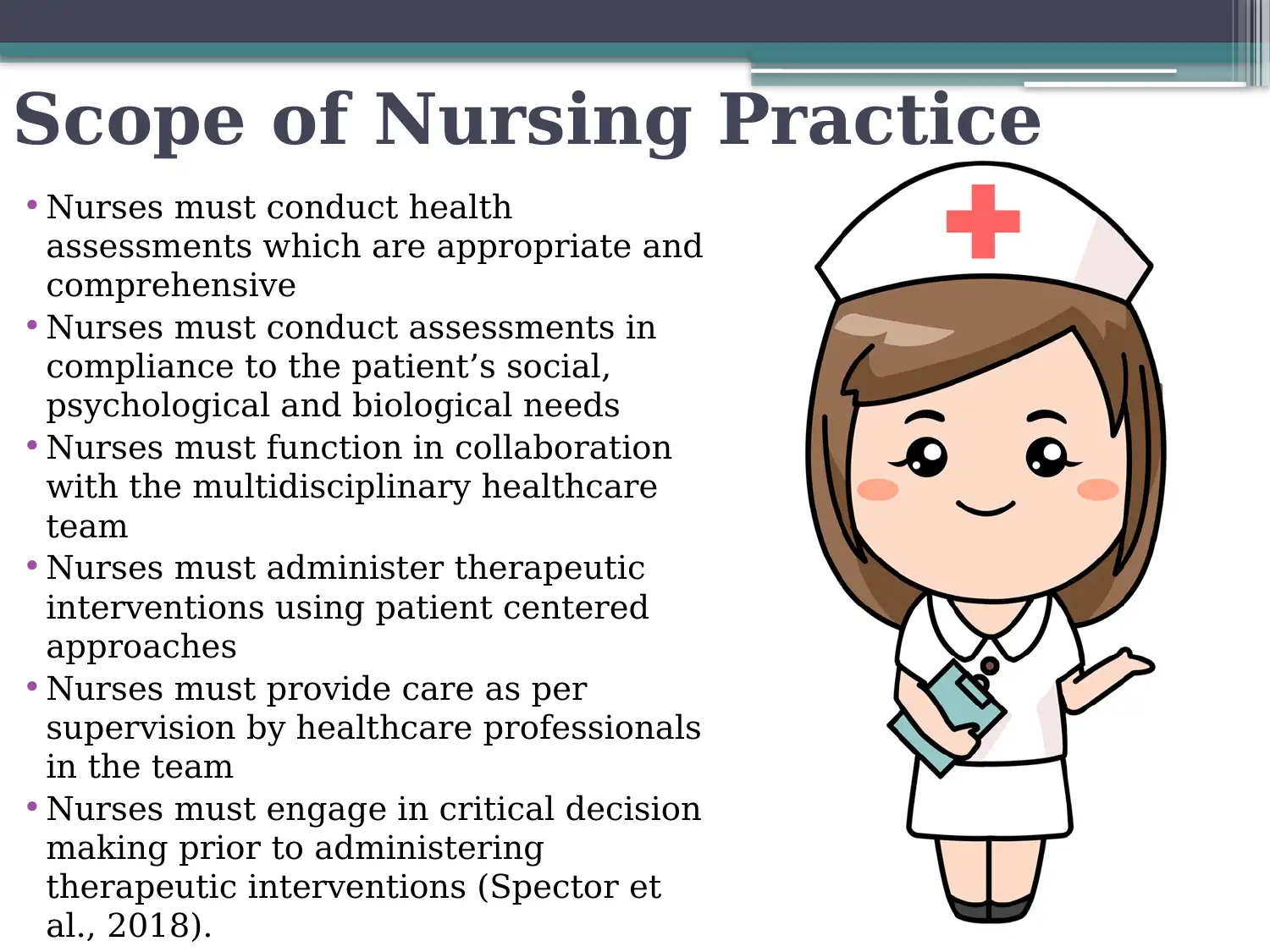
Scope of Nursing Practice
• Nurses must conduct health
assessments which are appropriate and
comprehensive
• Nurses must conduct assessments in
compliance to the patient’s social,
psychological and biological needs
• Nurses must function in collaboration
with the multidisciplinary healthcare
team
• Nurses must administer therapeutic
interventions using patient centered
approaches
• Nurses must provide care as per
supervision by healthcare professionals
in the team
• Nurses must engage in critical decision
making prior to administering
therapeutic interventions (Spector et
al., 2018).
• Nurses must conduct health
assessments which are appropriate and
comprehensive
• Nurses must conduct assessments in
compliance to the patient’s social,
psychological and biological needs
• Nurses must function in collaboration
with the multidisciplinary healthcare
team
• Nurses must administer therapeutic
interventions using patient centered
approaches
• Nurses must provide care as per
supervision by healthcare professionals
in the team
• Nurses must engage in critical decision
making prior to administering
therapeutic interventions (Spector et
al., 2018).
Paraphrase This Document
Need a fresh take? Get an instant paraphrase of this document with our AI Paraphraser
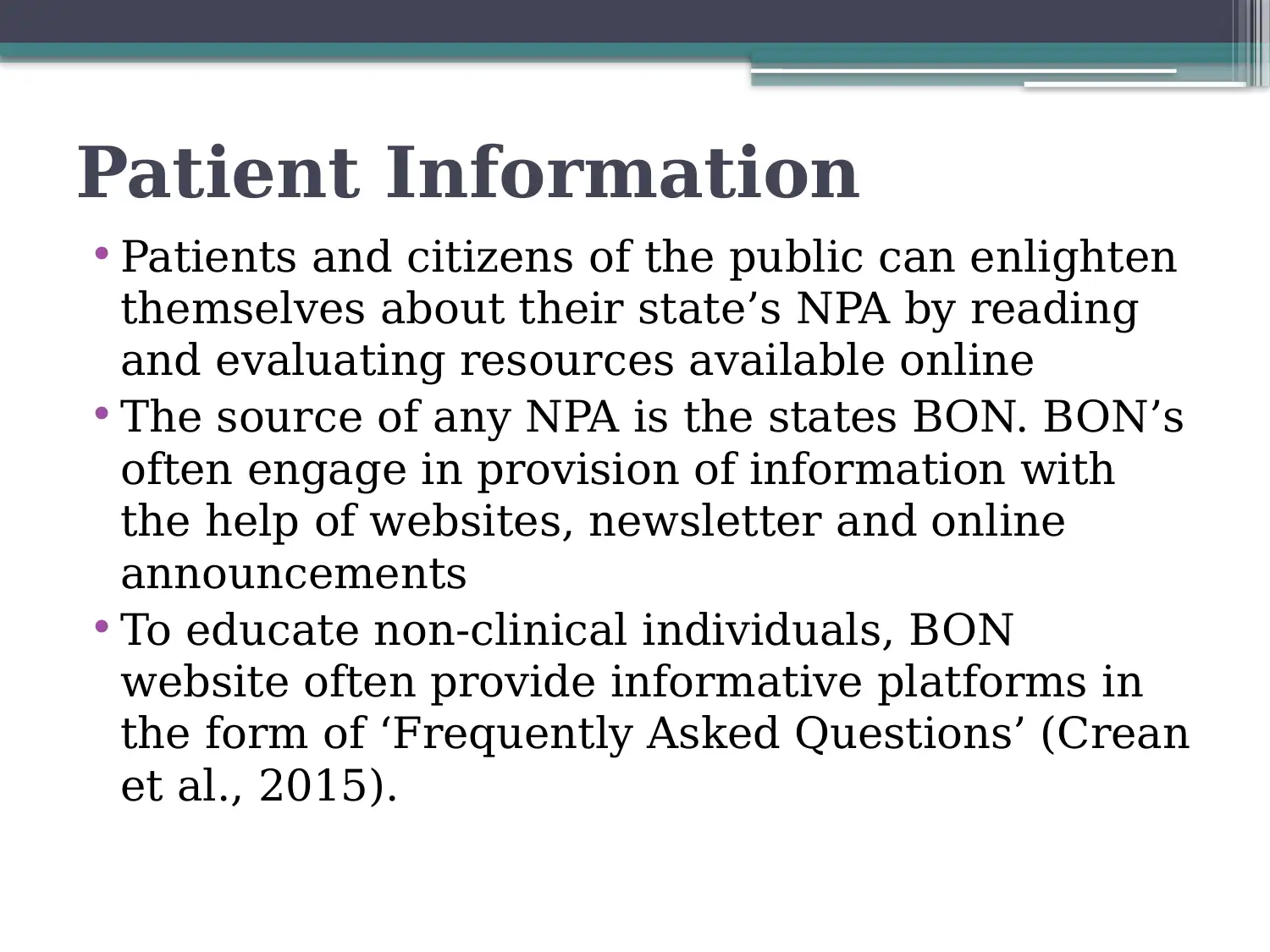
Patient Information
• Patients and citizens of the public can enlighten
themselves about their state’s NPA by reading
and evaluating resources available online
• The source of any NPA is the states BON. BON’s
often engage in provision of information with
the help of websites, newsletter and online
announcements
• To educate non-clinical individuals, BON
website often provide informative platforms in
the form of ‘Frequently Asked Questions’ (Crean
et al., 2015).
• Patients and citizens of the public can enlighten
themselves about their state’s NPA by reading
and evaluating resources available online
• The source of any NPA is the states BON. BON’s
often engage in provision of information with
the help of websites, newsletter and online
announcements
• To educate non-clinical individuals, BON
website often provide informative platforms in
the form of ‘Frequently Asked Questions’ (Crean
et al., 2015).
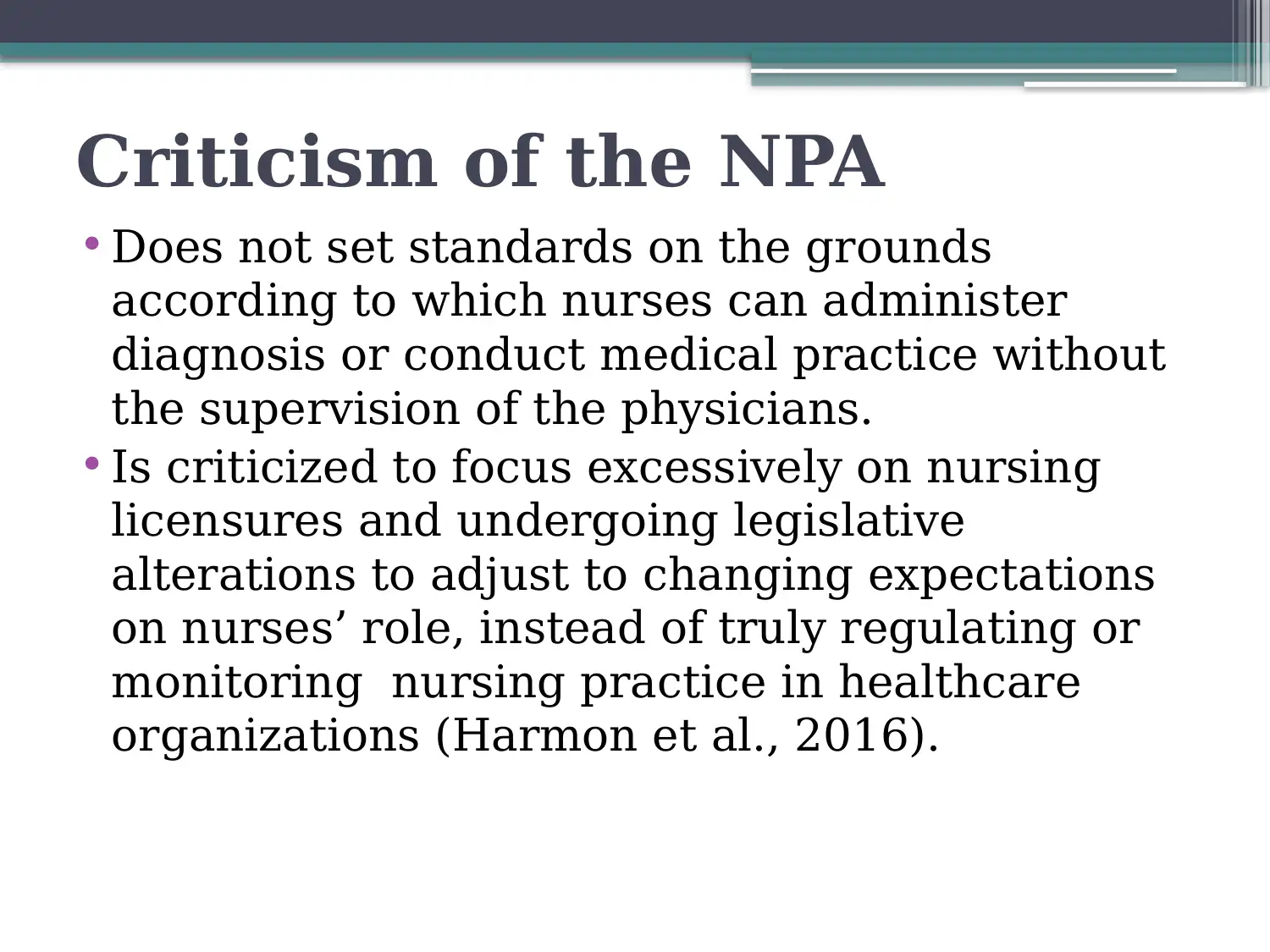
Criticism of the NPA
• Does not set standards on the grounds
according to which nurses can administer
diagnosis or conduct medical practice without
the supervision of the physicians.
• Is criticized to focus excessively on nursing
licensures and undergoing legislative
alterations to adjust to changing expectations
on nurses’ role, instead of truly regulating or
monitoring nursing practice in healthcare
organizations (Harmon et al., 2016).
• Does not set standards on the grounds
according to which nurses can administer
diagnosis or conduct medical practice without
the supervision of the physicians.
• Is criticized to focus excessively on nursing
licensures and undergoing legislative
alterations to adjust to changing expectations
on nurses’ role, instead of truly regulating or
monitoring nursing practice in healthcare
organizations (Harmon et al., 2016).
⊘ This is a preview!⊘
Do you want full access?
Subscribe today to unlock all pages.

Trusted by 1+ million students worldwide
1 out of 14
Related Documents
Your All-in-One AI-Powered Toolkit for Academic Success.
+13062052269
info@desklib.com
Available 24*7 on WhatsApp / Email
![[object Object]](/_next/static/media/star-bottom.7253800d.svg)
Unlock your academic potential
Copyright © 2020–2026 A2Z Services. All Rights Reserved. Developed and managed by ZUCOL.





